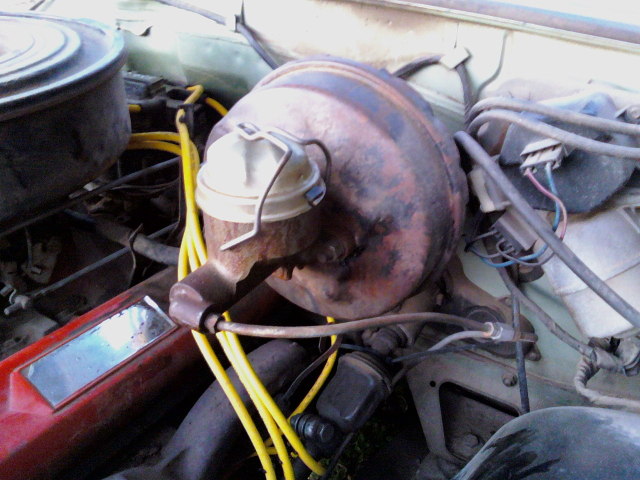Question Brake unit
Brake unit
QUESTION: Hello Mr.Sears
I've got a 64 Impala that I'm having a problem with. It has a power brake unit that did not come with the car (I'll attach a picture, but I'm not the one who installed it). When I hit the brakes, the right rear tire locks up before any of the others, enough to bring the car to a stop with the other three tires spinning. I've taken off all the drums, and the brake linings and drums are nearly mint. I've also taken out and repacked both of the front bearings, and completely cleaned and re-greased all four auto-adjustment screws so that they turn very easily, then drove the car back and fourth about 30 times to get enough braking in so that the brakes would auto-adjust.
I have bled the brake lines, though I'm not sure if I bled the rear brakes enough. The front two wheels sent a strong jet of bright clear brake fluid when I loosened the bleed screw, while the back two brakes seeped a darker color, without a strong spray. (I bled the brakes before cleaning the auto-adjust screws, but I don't believe it matters, should I bleed them again?) The brake line from the power unit goes to the front left wheel and splits (one to the wheel, one carries on), then to the front right wheel and splits, then under the car and I'm not sure how the lines go to the back two wheels, though I would assume they are in the same configuration as when they came stock(ie. left rear, right rear?).
Can you give me a list of things that would be the most common cause of this right-rear tire lock up? I'm pretty sure I need a new power brake unit (just from the feel of the brakes), but I thought I might be able to get all four brakes working properly before trying to search down another unit.
Thank you very much for your time.
ANSWER: In a closed hydraulic system pressure is transmitted throughout the system undiminished. What this means is that the master cylinder or the power brake system will not select one wheel to lock up. The problem is with either of the rear wheels. If the left rear wheel cylinder is frozen then there will be uneven braking. If the brake shoes are distorted even though they look good then there will be uneven braking. A kinked brake line will cause uneven braking.
Brad
---------- FOLLOW-UP ----------
QUESTION: So if the left-rear cylinder was frozen, then wouldn't the other three wheels be functional, and that one in particular would not work? What would the chances be of the other three wheels' pistons being frozen enough that only one of the brakes would function, even while the brakes are pressed as hard as I can push?
I plan on checking all the lines a second time, as well as bleeding the rear end again tomorrow (I picked up a one-person vacuum pump, just in case I didn't bleed them enough last time)
Thanks again, I appreciate your help in trying to track down where to start.
AnswerThe front wheels would have equal pressure on the ground on each tire and would be stopping the front end of the car with two wheels while if one of the back cylinders was frozen then only one wheel on the back would be exerting pressure and that one wheel would tend to lock up as you exerted more pressure on the brake pedal to try to stop with three wheels. As far as all the cylinders or several getting sluggish over a period of years the probability is good. I just had to replace the rear cylinders on my 94 Explorer as one was frozen. I too live in the rust belt.
Brad
